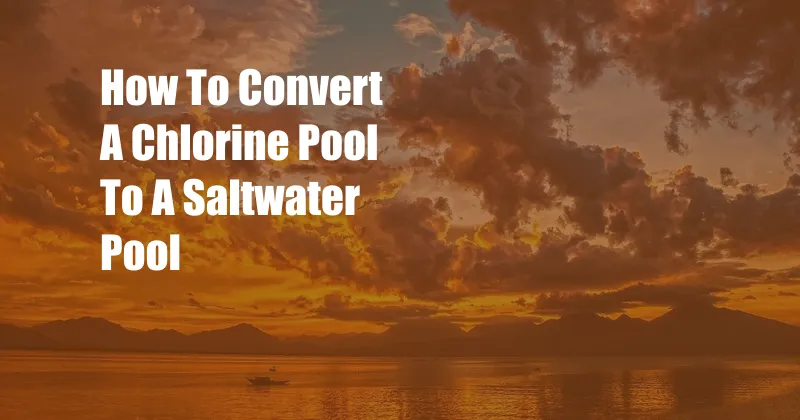
How to Convert a Chlorine Pool to a Saltwater Pool: A Comprehensive Guide
Imagine diving into a crystal-clear pool, surrounded by the gentle scent of the ocean, and feeling weightless as you float effortlessly in the water. That’s the blissful experience of a saltwater pool, and it’s more accessible than you might think. Converting your chlorine pool to saltwater is a smart investment that offers numerous benefits, from reducing harsh chemicals to enjoying softer, more refreshing water.
In this comprehensive guide, we’ll walk you through the process step by step, covering everything you need to know, from choosing the right equipment to enjoying the fruits of your labor. Get ready to dive into the world of saltwater pool bliss!
Understanding Saltwater Pools
Saltwater pools are swimming pools that use a salt chlorine generator to produce chlorine from salt, eliminating the need for harsh chemicals like chlorine tablets or shock treatments. The generator produces just enough chlorine to keep the pool sanitized, resulting in softer, gentler water that’s less irritating to your skin and eyes.
The key to a successful saltwater conversion lies in choosing the right equipment. You’ll need a salt chlorine generator, a salt test kit, and a pool cover. The generator is the heart of the system, producing chlorine from salt. The test kit helps you monitor the salt levels, ensuring they’re within the ideal range. And the pool cover prevents evaporation, which can affect the salt concentration.
Converting Your Pool: Step-by-Step Guide
- Drain the Pool: Empty your pool completely before starting the conversion process.
- Clean the Pool: Thoroughly clean the pool surfaces, removing any debris or algae.
- Install the Salt Chlorine Generator: Follow the manufacturer’s instructions to install the salt chlorine generator.
- Fill the Pool: Refill your pool with fresh water.
- Add Salt: Gradually add salt to the pool, following the manufacturer’s recommended dosage.
- Start the Generator: Turn on the salt chlorine generator and allow it to run.
- Monitor Salt Levels: Regularly check the salt levels using the test kit and adjust as needed.
- Enjoy Your Saltwater Pool: Once the salt levels are stable, you can enjoy your newly converted saltwater pool!
Tips and Expert Advice
- Choose the right salt: Use only pool-grade salt specifically designed for saltwater pools.
- Follow the manufacturer’s instructions carefully: Each salt chlorine generator is different, so read the instructions thoroughly before installation.
- Monitor the pool regularly: Check the salt levels and pH levels weekly to ensure the pool is balanced.
- Use a pool cover: Covering your pool when not in use helps prevent evaporation and maintain salt levels.
- Call a professional if needed: If you encounter any issues during the conversion process, don’t hesitate to contact a qualified pool professional.
Frequently Asked Questions
Q: Is converting a pool to saltwater expensive?
A: The initial cost of converting a pool to saltwater can be higher than traditional chlorine pools, but the long-term savings on chemicals and maintenance often offset the initial investment.
Q: How often do I need to add salt to my pool?
A: Salt levels should be checked regularly and adjusted as needed. The frequency will depend on usage and evaporation rate.
Q: Can I convert my pool back to chlorine?
A: Yes, it is possible to convert a saltwater pool back to chlorine. However, it requires draining the pool, removing the salt chlorine generator, and refilling the pool with fresh water.
Conclusion
Converting your chlorine pool to a saltwater pool is a rewarding investment that offers numerous benefits. By following the steps outlined in this guide, you can enjoy the crystal-clear, refreshing water of a saltwater pool without the harsh chemicals. Remember, if you have any questions or concerns during the conversion process, don’t hesitate to consult with a pool professional.
Are you ready to dive into the world of saltwater pool ownership? Embark on the conversion journey today, and experience the luxury of a saltwater pool in your own backyard. Your body and wallet will thank you for it!